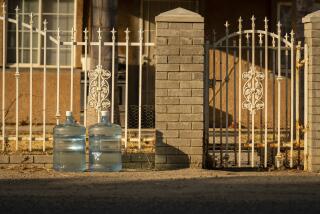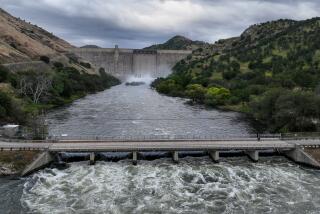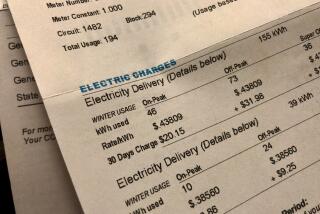Meter Will Soon Be Running on Port Hueneme’s Water Use
- Share via
Suzanne Graham does everything she can to save water, from using drip irrigation on her deck garden filled with drought-resistant plants to running only four full loads of laundry a month in her double-capacity washing machine.
The 66-year-old retired executive secretary for Warner Bros. Studios knows the ravages of drought firsthand from living in the arid West all her life.
Now the Colorado native resides in Port Hueneme, one of about 40 cities in the state where homes do not have water meters. The largest is Sacramento, with Fresno and Bakersfield not far behind.
In these communities, residents are free to wash their cars, water their lawns and run their dishwashers to their hearts’ content without worrying about burgeoning bills.
But all that will change this year, promises Assemblywoman Christine Kehoe (D-San Diego), who is sponsoring a bill that would force all California cities to measure their residential water usage. If approved, every home in the state would have to use water meters by 2009.
Previous efforts to mandate meters have been blocked in the Legislature, largely because of the strong fight mounted by non-metered cities.
But Port Hueneme, where single-family residents pay a flat rate of $25 a month for water, is not putting up a fight. The City Council approved a conversion in January and is seeking state grants to help cover the estimated $6-million cost to install meters in 22,000 homes.
“What we want to put in place is a conscious effort to try to conserve water,” said interim Utility Services Director Carrie Mattingly. “We’re sending the message that if you’re not careful, higher water use is going to cost you more.”
The beachside community began looking at its water consumption about 18 months ago with an eye toward cutting costs, City Manager Bob Hunt said.
“The idea is to save money for us and for the users of the water, which is a precious commodity,” he said. “If we know how much water we’re using, we can better control our purchases of water. Without metering, it’s hard to tell what that might be. We need to do a better job of purchasing.”
The city gets most of its water from United Water Conservation District in Oxnard, with a smaller amount from Calleguas Municipal Water District in Simi Valley.
State water experts estimate that consumers cut their usage by 20% when meters are installed. For Port Hueneme, that translates into a savings of 800 acre-feet a year, or $400,000 based on a price of $500 an acre-foot.
“Some people will see their rates go up a little. A majority will see their rates go down,” said city Water Supt. Gary Haggin. “It’s a give and take.”
Mattingly is not sure why previous administrations never introduced water meters but speculated that conversion costs and relatively cheap water rates posed strong disincentives.
About 5,000 newer residences in the city were built with meters, which have never been used.
A specific date for when meters would be installed in the remaining 22,000 homes has not been set, but it should be well before 2009, whether or not state law requires it, Mattingly said.
The time cannot come too soon for Graham, who pays the same monthly rate as a family of five.
“I live alone and I’m very careful about what I use,” Graham said. “I don’t waste water.”
Because her subdivision already has meters, she does not want to share the cost of installing meters in other parts of the city -- and told the City Council as much in January when it held a public hearing on the matter.
“There are some things I don’t mind paying for,” Graham said. “But I do mind paying for things I’m not using.”
More to Read
Sign up for Essential California
The most important California stories and recommendations in your inbox every morning.
You may occasionally receive promotional content from the Los Angeles Times.













